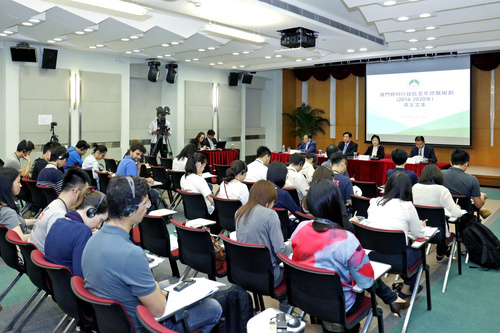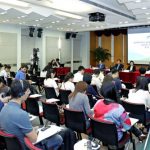 The Government releases the proposal for the Five-Year Development Plan (2016-2020) of the Macao Special Administrative Region at a press conference.
The Government releases the proposal for the Five-Year Development Plan (2016-2020) of the Macao Special Administrative Region at a press conference.
The Government is inviting members of the public to contribute their comments regarding the proposal for the Five-Year Development Plan, which focuses on the city’s socio-economic development covering 2016 to 2020. The Government is currently conducting a two-month public consultation, which runs until 30 June. The Five-Year Development Plan (2016-2020) of the Macao Special Administrative Region (Macao SAR) aims at laying down a blueprint for how the city can achieve its strategic aims of being a world centre of tourism and leisure, and a commercial and trade cooperation service platform between China and the Portuguese-speaking countries (collectively known as the “Centre and Platform” policies). The Government suggests four phases for realisation of the Centre policy, covering: initiation; acceleration; completion; and finalisation. The proposal for the Five-Year Development Plan also covers the following in relation to the Government's administrative effort: maintenance of stable development; prioritisation of projects related to people’s livelihoods; promotion of balanced and coordinated socio-economic development; and the sharing among the community of the fruits of development achieved by those concerted efforts. To transform Macao into a city with international-standard living and working conditions, transportation, and tourism and entertainment, the Government strives to realise seven development goals as outlined in the proposal for the Five-Year Development Plan. They are: 1) to maintain a steady development of the overall economy; 2) to make further progress in optimising the structure of the economy; 3) to foster the development of Macao as a city for international tourism; 4) to improve on a continuous basis residents’ quality of life; 5) to raise further the level of education among the city’s residents; 6) to achieve measurable results in environmental protection; and 7) to enhance the Government’s administrative efficiency and deepen legal development. Regarding the enhancement of Macao’s economic competitiveness and sustainable development, the Government intends to: promote innovation in ideas; promote internationally Macao’s diverse culture; boost the quality of education and the cultivation of local talent; optimise urban infrastructure; further develop Macao as a ‘smart’ city in information technology terms; bolster administrative efficiency; foster development of the “Centre and Platform” policies; and deepen regional cooperation while further complementing the country’s development. The Government additionally has a range of suggestions on how further to advance Macao’s special role in national development as envisaged under the country’s 13th Five-Year Plan. Regarding Macao’s development in the coming five years, the Government would step up efforts to achieve Macao’s moderate economic diversification; realise the Centre policy; and intensify regional cooperation. Regarding the city’s gaming industry, the Government’s aim would be to: support further the growth of non-gaming elements in local resorts; and maintain the stable development of the overall sector. The Government also suggests – under the proposal for the Five-Year Development Plan (2016-2020) of the Macao SAR – that living and social conditions in Macao should be optimised. This includes: creating a reserve of public land; enhancing urban planning and the development of infrastructure, transportation and environmental protection; optimising security and safety; promoting love for the country and for Macao; advancing opportunities in employment; advancing education opportunities and cultivation of local talent; improving welfare for residents and for disadvantaged groups; protecting the elderly; and improving healthcare services for all residents. The Government would additionally launch an action plan to facilitate development of local small- and medium-sized enterprises, while at the same time supporting the city’s mainstay industry. The proposal for the Five-Year Development Plan would also seek to coordinate and assist the growth of emerging industries. Under the proposed Plan, the Government is considering the establishment of a mechanism for allocate of public land. This would seek to ensure maintenance of a scientific and rational approach to land allocation. There would also be a plan to expand the number of professionals bilingual in Chinese and Portuguese, and ensure priority of employment for such professionals. In summary, the proposal for the Five-Year Development Plan (2016-2020) of the Macao SAR consists of: four parts; six chapters; 27 sections; and 24 sub-sections. The proposal document amounts to more than 37,000 Chinese characters. The current proposal has been compiled based on opinion gathered during last year’s public consultation on the fundamentals for the Five-Year Development Plan of the Macao SAR. The current proposal also comprises opinions from experts at the National Development and Reform Commission; from the Director of Tsinghua University’s Centre for China Studies, Professor Hu Angang; and from a member of the Social, Economic and Public Policy Research Centre of the Macao Polytechnic Institute, Professor Chen Qingyun. A full copy of the proposal for the Five-Year Development Plan (2016-2020) of the Macao SAR is available – in Macao’s official languages Chinese and Portuguese – for download via the website of the Chief Executive’s Office (http://www.gce.gov.mo); the website of the Committee for Development of the World Centre of Tourism and Leisure (http://www.cccmtl.gov.mo/); the Government Portal website of the Macao SAR (http://www.gov.mo); and the website of the Government Information Bureau (http://www.gcs.gov.mo). To promote better understanding of the proposal for the Five-Year Development Plan (2016-2020) of the Macao SAR, two videos will be made available to the public. They will be distributed via several media outlets, namely: local television channels; programmes on local radio; online social platforms; television screens located in public areas of various government departments; and on television screens in public buses. Members of the public are welcome to contribute their opinions before 30 June via the website of the Committee for Development of the World Centre of Tourism and Leisure (http://www.cccmtl.gov.mo/); or by email to: message@gep.gov.mo; or by post to: Post Office Box No.1201; or by telephone on +853 2882 3610; or by fax to +853 2882 3426; or in person (by prior appointment only) to representatives of the Policy Research Office at Rua do Desporto, No.185-195, Taipa, Macao.


